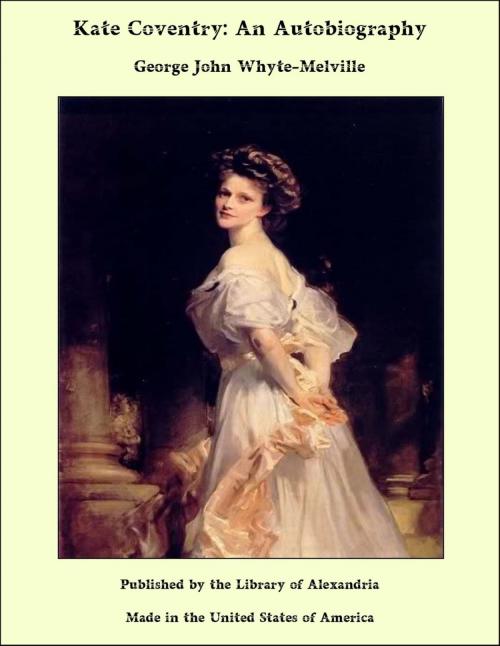Kate Coventry: An Autobiography
Nonfiction, Religion & Spirituality, New Age, History, Fiction & Literature| Author: | George John Whyte-Melville | ISBN: | 9781465619181 |
| Publisher: | Library of Alexandria | Publication: | March 8, 2015 |
| Imprint: | Language: | English |
| Author: | George John Whyte-Melville |
| ISBN: | 9781465619181 |
| Publisher: | Library of Alexandria |
| Publication: | March 8, 2015 |
| Imprint: | |
| Language: | English |
Kate, said Aunt Deborah to me as we sat with our feet on the fender one rainy afternoon—or, as we were in London, I should say one rainy morning—in June, "I think altogether, considering the weather and what not, it would be as well for you to give up this Ascot expedition, my dear." I own I felt more than half inclined to cry—most girls would have cried—but Aunt Deborah says I am very unlike the generality of women; and so, although I had ordered a peach-coloured mantle, and such a bonnet as can only be seen at Ascot on the Cup Day, I kept back my tears, and swallowed that horrid choking feeling in my throat, whilst I replied, with the most careless manner I could assume, "Goodness, aunt, it won't rain for ever: not that I care; but think what a disappointment for John!" I must here be allowed the privilege of my sex, to enter on a slightly discursive explanation as to who Aunt Deborah is and who I am, not forgetting Cousin John, who is good-nature itself, and without whom I cannot do the least bit. My earliest recollections of Aunt Deborah, then, date from a period when I was a curly-headed little thing in a white frock (not so very long ago, after all); and the first occasion on which I can recollect her personality with any distinctness was on a certain birthday, when poor grandfather said to me in his funny way, "Kate, you romp, we must get you a rocking-horse." Aunt Deborah lifted up her hands and eyes in holy horror and deprecation. "A rocking-horse, Mr. Coventry," said she; "what an injudicious selection! (Aunt Deborah likes to round her periods, as the book-people say.) The child is a sad tomboy already, and if you are going to teach her to ride, I won't answer for the consequences in after-life, when the habits of our youth have become the second nature of our maturity." Imagine such sentiments so expressed by a tall austere lady, with high manly features, piercing dark eyes, a front of jet-black hair coming low down on a somewhat furrowed brow. Cousin John says all dark women are inclined to be cross; and I own I think weblondes have the best of it as far as good temper is concerned. My aunt is not altered in the slightest degree from what she was then. She dresses invariably in gray silks of the most delicate shades and texture; carries spectacles low down upon her nose, where they can be of no earthly use except for inspection of the carpet; and wears lavender kid gloves at all hours of the day and night—for Aunt Deborah is vain of her hand, and preserves its whiteness as a mark of her birth and parentage. Most families have a crotchet of some sort on which they plume themselves; some will boast that their scions rejoice one and all in long noses; others esteem the attenuated frames which they bequeath to their descendants as the most precious of legacies; one would not part with his family squint for the finest pair of eyes that ever adorned an Andalusian maiden; another cherishes his hereditary gout as a priceless patent of nobility; and even insanity is prized in proportion to the tenacity with which it clings to a particular race.
Kate, said Aunt Deborah to me as we sat with our feet on the fender one rainy afternoon—or, as we were in London, I should say one rainy morning—in June, "I think altogether, considering the weather and what not, it would be as well for you to give up this Ascot expedition, my dear." I own I felt more than half inclined to cry—most girls would have cried—but Aunt Deborah says I am very unlike the generality of women; and so, although I had ordered a peach-coloured mantle, and such a bonnet as can only be seen at Ascot on the Cup Day, I kept back my tears, and swallowed that horrid choking feeling in my throat, whilst I replied, with the most careless manner I could assume, "Goodness, aunt, it won't rain for ever: not that I care; but think what a disappointment for John!" I must here be allowed the privilege of my sex, to enter on a slightly discursive explanation as to who Aunt Deborah is and who I am, not forgetting Cousin John, who is good-nature itself, and without whom I cannot do the least bit. My earliest recollections of Aunt Deborah, then, date from a period when I was a curly-headed little thing in a white frock (not so very long ago, after all); and the first occasion on which I can recollect her personality with any distinctness was on a certain birthday, when poor grandfather said to me in his funny way, "Kate, you romp, we must get you a rocking-horse." Aunt Deborah lifted up her hands and eyes in holy horror and deprecation. "A rocking-horse, Mr. Coventry," said she; "what an injudicious selection! (Aunt Deborah likes to round her periods, as the book-people say.) The child is a sad tomboy already, and if you are going to teach her to ride, I won't answer for the consequences in after-life, when the habits of our youth have become the second nature of our maturity." Imagine such sentiments so expressed by a tall austere lady, with high manly features, piercing dark eyes, a front of jet-black hair coming low down on a somewhat furrowed brow. Cousin John says all dark women are inclined to be cross; and I own I think weblondes have the best of it as far as good temper is concerned. My aunt is not altered in the slightest degree from what she was then. She dresses invariably in gray silks of the most delicate shades and texture; carries spectacles low down upon her nose, where they can be of no earthly use except for inspection of the carpet; and wears lavender kid gloves at all hours of the day and night—for Aunt Deborah is vain of her hand, and preserves its whiteness as a mark of her birth and parentage. Most families have a crotchet of some sort on which they plume themselves; some will boast that their scions rejoice one and all in long noses; others esteem the attenuated frames which they bequeath to their descendants as the most precious of legacies; one would not part with his family squint for the finest pair of eyes that ever adorned an Andalusian maiden; another cherishes his hereditary gout as a priceless patent of nobility; and even insanity is prized in proportion to the tenacity with which it clings to a particular race.















